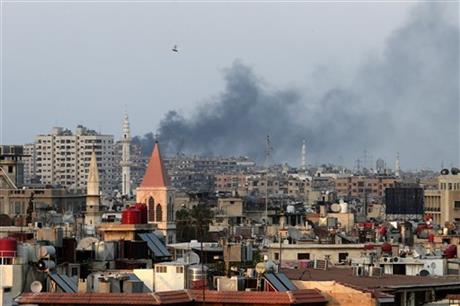
By ALBERT AJI
Columns of smoke rising from heavy shelling in the Jobar neighborhood in west Damascus, in Cairo, Syria, Thursday, Aug. 22, 2013. President Bashar Assad’s forces pressed on with a military offensive in eastern Damascus on Thursday, bombing rebel-held suburbs where the opposition said a chemical weapons attack the day before killed over 100 people. The government has denied allegations it used chemical weapons in artillery barrages on the area known as eastern Ghouta on Wednesday as “absolutely baseless.” (AP Photo/Hassan Ammar)
DAMASCUS, Syria (AP) — Syrian state media accused rebels of using chemical arms on Saturday against government troops trying to storm a contested neighborhood of Damascus, claiming a major army offensive in recent days had forced the opposition fighters to resort to such weapons “as their last card.”
State TV broadcast images of plastic jugs, gas masks, vials of an unspecified medication, explosives and other items that it said were seized from rebel hideouts. It did not, however, show any video of soldiers reportedly affected by toxic gas in the fighting in the Jobar neighborhood of Damascus.
Still, the claims could muddy the debate about who was responsible for an alleged gas attack on rebel-held suburbs of the capital on Wednesday that activists say killed more than 130 people. That attack has spurred demands for an independent investigation and renewed talk of potential international military action if chemical weapons were indeed used.
Just hours before the state media reports, the U.N. disarmament chief arrived in Damascus to press President Bashar Assad’s regime to allow U.N. experts to investigate Wednesday’s alleged attack. The Assad regime has denied allegations that it was behind that attack, calling them “absolutely baseless” and suggesting they are an attempt to discredit the government.
The U.S., Britain, France and Russia have urged the Assad regime and the rebels fighting to overthrow him to cooperate with the United Nations and allow a team of experts already in Syria to look into the latest purported use of chemical agents. The U.N. secretary-general dispatched Angela Kane, the high representative for disarmament affairs, to push for a speedy investigation into Wednesday’s purported attack. She did not speak to reporters upon her arrival in Damascus Saturday.
With the pressure increasing on the regime to comply, Syria’s state media alleged on Saturday that rebels in the contested district of Jobar had used chemical weapons against government troops advancing into the area.
The state news agency said several government troops who took part in an offensive experienced severe trouble breathing or even “suffocation” after “armed terrorist groups used chemical weapons.” It was not clear what was meant by “suffocation” and the report mentioned no fatalities among the troops.
The government refers to rebels fighting to topple Assad as “terrorists.”
“The Syrian Army achieved major progress in the past days and for that reason, the terrorist groups used chemical weapons as their last card,” the Syrian state TV said.
That report was followed by an unusual string of breaking alerts on the TV’s news scroll that made a series of claims related to the alleged use of chemical arms by rebels in the Jobar neighborhood.
One message cited a Syrian TV journalist who is embedded with the troops in the district who said the army confiscated an arms cache that included gas masks and several barrels with “made in Saudi Arabia” stamped on them. It did not say what was in the barrels, but appeared to suggest that some sort of chemical agent was inside and supplied by Saudi Arabia, the region’s Sunni Muslim power and a staunch supporter of Syria’s Sunni-led revolt.
Another news scroll said that troops, after overrunning rebel positions, discovered antidotes following exposure to chemical agents. The TV said the medicines were produced by a Qatari-German medical supplies company. Qatar is another strong supporter of the Syrian rebels.
The report could not be immediately verified.
For days, the government has been trying to counter rebel allegations that the regime used chemical weapons on civilians in rebel-held areas of eastern Damascus, arguing that opposition fighters themselves were responsible for that attack.
On Saturday, French Foreign Minister Laurent Fabius said dismissed the government line.
“All the information we have is converging to indicate there was a chemical massacre in Syria, near Damascus, and that Bashar Assad’s regime was behind it,” Fabius told reporters during a visit to the West Bank city of Ramallah. He did not elaborate.
France has suggested that force could be used against Syria if Assad’s regime was proven to have used chemical arms.
The new talk of potential military action in Syria has made an independent investigation by U.N. inspectors critical to determine what exactly transpired.
The U.N. experts already in Syria are tasked with investigating three earlier purported chemical attacks in the country: one in the village of Khan al-Assal outside the northern city of Aleppo in March, as well as two other locations that have been kept secret for security reasons.
It took months of negotiations between the U.N. and Damascus before an agreement was struck to allow the 20-member team into Syria to investigate. Its mandate is limited to those three sites, however, and it is only charged with determining whether chemical weapons were used, not who used them.
Syria’s Deputy Prime Minister Qadri Jamil told The Associated Press on Thursday that he was personally in favor of a fair, transparent international delegation to investigate the latest incident. But he said that would require a new agreement between the government and the United Nations, and that the conditions for such a delegation would need to be studied.



